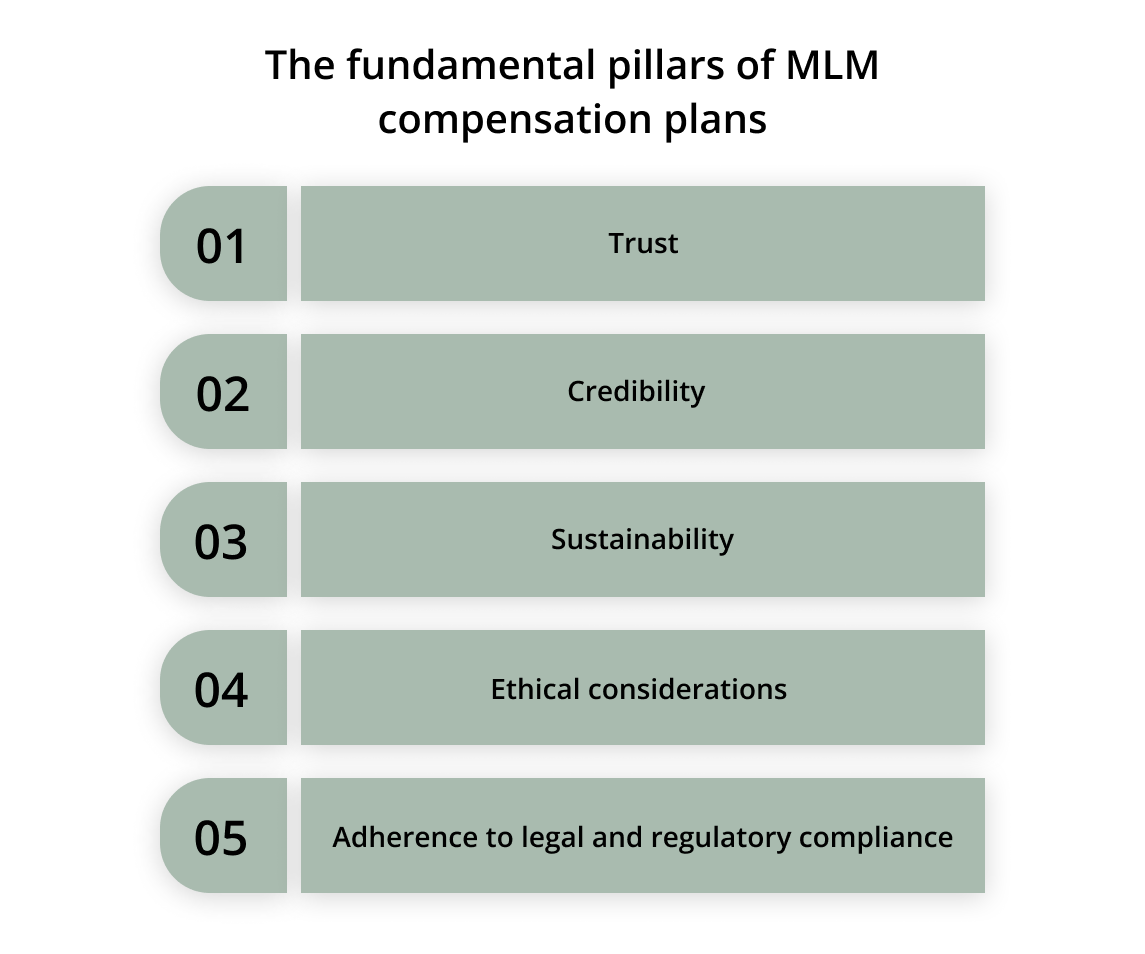Network marketing heavily relies on motivated distributors who drive sales and build their network. To incentivize these individuals, a well-designed compensation plan is crucial. However, beyond mere financial rewards, fairness and equity are core principles that underpin a successful and sustainable MLM business.
Similar to how a solid foundation is essential for a robust building, understanding the fundamentals of an MLM compensation plan marks the beginning of appreciating the significance of fairness and equitability within this domain.
MLM compensation plan: An overview
One of the integral elements that can make or break the success of an MLM business is its compensation plan.
What is an MLM compensation plan?
MLM compensation plan refers to a structured method through which MLM companies reward their distributors for individual sales as well as sales generated by their downlines.
While a well-thought-out compensation plan is essential for success in MLM, it's equally important to have the right software backing it up. This is the defining moment where Epixel MLM Software becomes your go-to product, pioneering the way in meeting the requirements and guiding businesses to enhance the effectiveness of their compensation plans.
The platform recognizes that compensation plans are not one-size-fits-all. And so, it offers robust customization and management features that empower businesses to create compensation structures that precisely align with their objectives. It also ensures equitable rewards for distributors, thereby fostering sustained motivation within the network.
So now is the time to prepare your mind to accommodate crucial concepts that will shape our understanding as we navigate through this article.
Different types of MLM plans
MLM compensation plan primarily includes binary, unilevel, and matrix. Other types include stairstep breakaway, board, generation, monoline, and hybrid MLM plans.
Binary MLM plan

Binary MLM plan uses a "two-legged" structure that allows distributors to build teams on their left and right sides, adding only two downlines directly. Its compensation structure rewards distributors based on the performance of their weaker leg or ‘pay leg’.
MLM businesses choosing binary plan can integrate binary MLM software for automating and managing core MLM tasks including commission management and payouts.
Unilevel MLM plan

Unilevel MLM plan is a ‘universal plan’ that enables sponsors to have an unlimited number of frontline members on a single level. In this plan, bonuses and compensation are determined by individual performance and group efforts.
MLM companies have the flexibility to determine the specific number of levels in which commissions are paid and the commission percentage differs for each level.
Matrix MLM plan

Matrix MLM plan is a limited plan structure with a fixed width and depth (w*h). This allows only a particular number of distributors at each level. For example, in a 3x3 matrix for MLM, you can have three distributors in width up, spanning up to three downline levels.
Because of the limited plan structure, network marketing businesses can exercise greater control over the volumes of payouts. Different compensations are incorporated to motivate and encourage the team to achieve higher sales targets.
Stairstep breakaway MLM plan

Stairstep breakaway MLM plan is a compensation structure that rewards distributors with higher commissions and bonuses as they achieve higher ranks. Distributors can "break away" from their upline and form their own group under the admin upon reaching a specific rank.
This plan is favored by network marketing companies because it is designed to encourage distributors to build a strong and stable organization.
Board MLM plan

Board MLM plan, also known as matrix cycle or revolving matrix plans, positions distributors in a pre-defined matrix. When a distributor completes a matrix as specified by the organization called board, then he/she is placed on top of a new board.
Businesses adopt the board MLM plan due to its structure, which nurtures a dynamic and streamlined network. This motivates members to collaborate closely with their teams to attain commission objectives.
Generation MLM plan

In the generation MLM plan, distributors are grouped into generations which is usually defined by their downline activity (sales volume or customer purchases). Here, distributors and customers are added as downlines in the generation genealogy tree. As members within a generation reach specific sales targets, the entire generation earns commissions and bonuses.
The generation MLM plan's commitment to product-centric strategies ensures consistent customer acquisition and retention, and product movement. This dynamic nature encourages ecommerce businesses to enhance their sales performance, potentially benefiting both the company and the salesforce.
Monoline MLM plan

Monoline MLM plan is known as a single leg MLM plan or linear MLM plan. It operates on a single-line structure, that is, every new distributor is vertically placed in a single line.
The Monoline compensation plan pays individuals for the sales generated by their downlines, extending payment benefits to unlimited levels or as specified by the company.
Hybrid MLM plan
Hybrid MLM plan is a mix-and-match approach that blends two established plans, combining the positives of both plans. They adopt the genealogy structure of a specific plan along with the payout structure of another plan or merge the payout structures of two plans while maintaining a single plan's genealogy structure.
The hybrid MLM plan provides flexibility and adaptability to changing market trends. Yet, the need for developing a hybrid plan fluctuates based on the specific demands of the business and prevailing economic conditions.
From what we have gathered until now, it's clear that MLM compensation plans are structured to recognize the distributor’s efforts for various activities, including:
Product sales: Earning commissions on directly sold products.
Team building: Bonuses for bringing new members to the network and building their downlines.
Rank advancement: Increased earning potential by climbing up the ranks through sales and team performance.
Now, let's spotlight the heartbeat of our conversation—the pivotal role of fairness and equity in MLM compensation plans.
About 40% organizations are opting for new technologies to automate and improve their compensation management process to ensure faster and accurate payout process that adds to improved distributor motivation.
Importance of fairness and equity in these plans
Imagine a puzzle without its central piece—undoubtedly incomplete. Would you leave it as is or embark on a search for the missing part?
The choice is clear.
Similarly, envision a business without a fair and equitable compensation plan. In such scenarios, distributors may lack motivation and rewards, potentially jeopardizing the integrity and success of an MLM venture. Hence, recognizing the importance of fairness and equity in MLM compensation plans becomes essential, ensuring every distributor has an equal opportunity for success.

But beneath the promise of building an empire from your basement and achieving financial independence lies a complex reality, often marred by unfair compensation plans. This is what leads to high attrition rates that cast a shadow on the industry's reputation. So, why is addressing these issues given paramount importance in the industry today?
Once we cover the core idea of fairness in MLM compensation plans, we’ll be able to uncover the answer.
Fairness as a core principle
Firstly, we need to ensure one thing—fairness in MLM compensation plans isn't just about ticking boxes. It's more about creating a culture of ethical conduct, where integrity and mutual respect are the guiding principles. Companies that prioritize ethical sourcing, responsible product development, and community engagement not only ensure fairness but also build trust, a vital ingredient for long-term sustainability.
When fairness is the core principle in MLM compensation plans then it helps in:
Attracting and retaining distributors
A fair compensation plan ensures that rewards are distributed equitably based on effort, performance, and contributions, creating a sense of trust and satisfaction among distributors.
It motivates the salesforce to actively engage in building their networks and promoting the company's products or services.
Knowing that their hard work will be duly recognized and rewarded, distributors are more likely to invest their time and energy, leading to increased retention rates and a stronger, more dedicated distributor base.
Building trust and credibility
Trust is crucial for maintaining a positive and productive work environment. When distributors believe that they are being treated fairly and compensated equitably for their efforts, they are more likely to trust the company and its leadership.
When trust is upheld, it breeds credibility for the MLM company, which is vital for attracting both distributors and customers.
They become more willing to invest their time and effort in promoting the company's products or services and adding new downline members.
Mitigating legal and regulatory risks
MLM compensation plans are built on integrity which encourages openness and honesty. However, when misleading strategies or unrealistic claims are employed, it can lead to legal consequences, thereby damaging the company's reputation.
MLM companies must thoroughly understand the legal requirements of the countries and jurisdictions in which they operate. This includes regulations governing compensation plans, IDS requirements, consumer protection, and laws against pyramid schemes.
A fair and equitable compensation plan ensures compliance with these regulations and protects both the company and its distributors.
Reducing skepticism and criticism
A fair compensation plan addresses concerns about potential exploitation or unfair advantages for certain individuals or levels within the network.
By prioritizing fairness, MLM companies demonstrate a commitment to ethical business practices, fostering trust and transparency among their distributors and customers.
This approach helps to build a positive reputation by creating an environment where distributors feel valued and rewarded in proportion to their efforts and contributions.
Fostering long-term relationships
A culture of fairness not only encourages sustained dedication but also promotes a positive and collaborative atmosphere within the network marketing community, thereby strengthening the bond between the company and its distributors.
A sense of trust and transparency are the key elements for building a strong foundation for long-term relationships.
As distributors perceive the system as equitable, they are more likely to remain dedicated, build robust teams, and contribute to the overall success and growth of the company.
Positive reputation
Organizations that prioritize fairness and equity in their compensation plans contribute to the positive reputation of the MLM industry as a whole.
By demonstrating transparency, integrity, and adherence to ethical practices, these organizations help dispel negative stereotypes associated with MLM businesses and foster customer loyalty.
When a brand’s identity becomes synonymous with trustworthiness and integrity due to its fair and equitable compensation plan, it ultimately contributes to positive word-of-mouth and increases the scope of affiliate marketing.
Ethical aspects
Ensuring fairness and equity helps MLM companies avoid accusations of unethical business practices, exploitation, or deceptive marketing tactics.
MLM companies must disclose the details of their compensation plans clearly, including information about the structure of commissions, bonuses, and other incentives.
This helps distributors make informed decisions about joining the company and pursuing their business opportunities.
To wrap it up, fairness is a fundamental principle that should guide the design and implementation of MLM compensation plans. It contributes to the overall satisfaction and motivation of members, creating a positive ripple effect on team dynamics and productivity.
A fair and equitable compensation plan also ensures that all individuals in the marketing network have an equal opportunity to succeed, regardless of their position or level of experience.
Key components of a fair plan
Let’s take a quick quiz!
Imagine you're designing an MLM compensation plan—what are the key components that would ensure its fairness?
If you're met with silence or uncertain guesses, worry not, as we are about to cover that next. Here we go!
1. Income distribution: Network marketing companies must ensure that the MLM compensation plan prioritizes equitable income distribution, fostering a sense of fairness among distributors.
2. Fair opportunity: Design the compensation plan to provide every individual with a fair opportunity to earn income and advance within the system, emphasizing fairness as a core principle.
3. Income equality: Establish a system where distributors are rewarded reasonably based on their efforts and achievements, promoting income equality within the MLM structure.
4. Equal opportunity: Minimize advantages to early joiners by structuring the plan in a way that provides equal opportunities for both early and late joiners, ensuring fairness throughout the network's growth.
5. Transparent compensation structure: Maintain transparency and clarity in all aspects of the compensation plan, including commissions, bonuses, incentives, etc. This provides distributors with a clear understanding of how their earnings are analyzed, calculated, and distributed.
6. Balanced incentives for product sales and team building: Align incentives to equally emphasize both product sales and team building, encouraging a balanced approach that benefits the individual and the overall team dynamics.
7. Non-discriminatory: Uphold a non-discriminatory policy, ensuring that age, gender, race, or location do not influence opportunities for salesforce, fostering an inclusive and diverse MLM community.
8. Regular evaluation and improvement: Implement a system for regular evaluation and improvement of the compensation plan, adapting to changing market conditions, enhancing overall effectiveness and fairness.
9. Feedback mechanisms: Establish effective feedback mechanisms within the MLM structure to allow distributors to express their opinions and concerns, creating a platform for continuous improvement and communication between the company and its network.
Tech-driven excellence: Restructuring MLM compensation plans for fairness and efficiency
What’s your favorite part of growing up in this tech-driven world? Obviously, it’s the technology itself. Same is the scenario in the direct selling industry. With technology came unprecedented connectivity, streamlined operations, and innovative marketing strategies. So, what it looks like when we apply it in fair compensation plan?
Again, thanks to the transformative power of technology, because it offered:
Efficiency in tracking and reporting
Utilize advanced downline tracking software to monitor individual and team performance in real-time.
Implement robust reporting systems for accurate and up-to-date insights into sales, team performance, and key metrics.
Scalability
Employ scalable technology solutions that can seamlessly adapt to the expanding needs of the MLM network.
Ensure the infrastructure can handle growing data volumes and user interactions without compromising efficiency.
Data analytics
Leverage data analytics tools to gain valuable insights into distributor behaviors, market trends, and performance patterns.
Use predictive analytics to anticipate future trends and adjust compensation plans accordingly.
Automation of complex calculations
Integrate automation tools like MLM calculator for precise and timely calculation of commissions, bonuses, and incentives.
Minimize errors and enhance efficiency by automating intricate compensation calculations.
Fairness metrics
Implement metrics for assessing and ensuring fairness, such as rank advancement rates and income distribution across different levels and ranks.
Use analytics to evaluate how evenly performance-based rewards are distributed among distributors.
Customization and adaptability
Provide customizable features to accommodate diverse compensation structures and adapt to the unique needs of the MLM business.
Ensure that the technology allows for easy adjustments to accommodate changes in compensation plans.
Adapting to changing needs
Employ agile and adaptive technology solutions that can quickly respond to changes in industry regulations, market dynamics, and business requirements.
Facilitate rapid updates to compensation plans to keep them aligned with evolving goals.
Transparency through software
Utilize software platforms that offer transparent and accessible information on compensation structures, earnings, and performance metrics.
Empower distributors with a clear understanding of how their compensation is calculated and distributed.
Communication tools
Integrate effective communication tools like AI-enabled chatbots to foster collaboration among distributors, enhancing team dynamics and mutual support.
Facilitate direct and instant communication channels to keep the network informed and engaged.
Training and support integration
Incorporate technology for seamless integration of distributor training modules and support systems.
Provide easily accessible resources and tools through digital platforms to empower distributor performance in direct selling.
Discover how we build resilient businesses with advanced MLM functionalities
Strike the right balance
The moment you think we’re about to conclude is the very moment you’re going to start. Because fairness is a journey, not a destination.
Let’s recap:
The hope of a better world can be simply explained with two powerful words: fairness and equitability. These two entities are the cornerstone of trust, binding people together, and forming the foundation of healthy, lasting connections.
In this context, MLM companies introduce compensation plans that aim to uphold these values by providing equal opportunities, rights, and resources to all distributors.
By continuously striving for a compensation plan that reflects its values, an MLM company can position itself for lasting growth and success in a competitive market.
Provide easily accessible resources and tools through digital platforms to empower distributor performance in direct selling.
By prioritizing a just and equitable compensation plan, companies cultivate trust, attract and retain talent, foster sustainable growth, and build a positive brand image.
By leveraging technology and constantly evaluating and improving the plan, MLM companies can create an environment where everyone benefits, from distributors to customers and the company itself.
Remember, in the MLM community, everyone has a role to play in upholding fairness.
Navigate the complex world of business with confidence through our expert MLM consulting service.
Explore Now➔








Leave your comment
Fill up and remark your valuable comment.